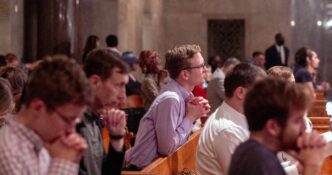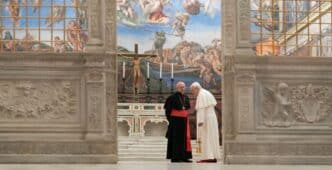Joy is one of the greatest paradoxes of the Christian life — rooted in Christ’s own life and teaching, yet often difficult to grasp amid suffering, uncertainty and the ordinary messiness of life. What exactly is joy, and how can we live it? In the latest episode of the Our Sunday Visitor magazine partner podcast “Like a Mother with Katie McGrady,” host Katie McGrady sat down with renowned Catholic philosopher and author Peter Kreeft to explore this timeless question not long before the recent papal election.
In the episode, Kreeft combined sharp insight and a dose of humor with decades of philosophical reflection and spiritual practice to tackle a topic that many people quietly struggle with. Describing himself as a “curmudgeon” and a natural pessimist, he might not seem like the obvious choice to write a book called “The Mystery of Joy.” But it is this very contrast that challenges our assumptions about what joy is and where it comes from.
Here are four key insights from Kreeft on the mystery of joy:
Joy is a fact, not a feeling
One of the most surprising truths Kreeft unpacked in the episode is that joy is not merely a feeling. In a culture that often equates happiness with fleeting emotions or external circumstances, this perspective offers a radical shift.
Noting that “feelings are largely involuntary,” he pointed out that many people mistakenly take too much credit for their positive emotions — or too much blame for their negative ones — forgetting that feelings are, in the end, gifts. “Feelings come to you, they don’t come from you,” he shared. “They’re gifts of God.”
That doesn’t mean we don’t have some responsibility for our feelings or can’t choose what to do with our feelings: “Even though that choice is subconscious as well as conscious, it’s our choice,” he said. Nor are feelings unimportant: “A complete human being, even in heaven, is one with right feelings,” Kreeft said, pointing to the example of Christ himself. “Jesus, having complete human nature, has feelings for us now. Because the Ascension did not undo the Incarnation, he still has the totality of his human nature. So he fully understands our feelings, sharing them himself.”
However, it’s a grave error to mistake a transient feeling for the joy of Christ.
Our complicated lives vs. God’s simplicity
In an increasingly complex world, we often assume that the path to joy must also be complicated. But Kreeft offered a countercultural take: Joy, like faith itself, is grounded in simplicity. “Trust and obey,” he said, quoting an old Protestant hymn. “That’s really all you need. Trust God with your sufferings and obey his will and thank him for your joys. And that’s about it. Life is really simpler than we think.”
This simplicity isn’t about ignoring the real messiness of life — it’s about reorienting our focus. “The object of our faith and hope and love is not ourselves or our own feelings,” Kreeft explained, “but it’s God himself.” It’s this divine relationship, not a technique or formula, that ultimately gives meaning to both our suffering and our joy.
Why, then, do we insist on making things more complicated? Kreeft suggested it may be a byproduct of modern culture: “Maybe we complicate it so that it’s more like technology, which we’re very good at. … If we have a spiritual technology, maybe we can build a machine with buttons, and if we press the right button, we get what we want.”
Even beauty can teach us something about simplicity. Kreeft contrasted the unified grandeur of a Gothic cathedral with the often disjointed feel of modern structures. “Walk into a Gothic cathedral and the whole thing is the same thing. It’s heaven,” he shared. The same could be said for the spiritual life: True joy doesn’t come from mastering a system, but from stepping into the unity and simplicity of God’s presence.
Trust is the door to joy
For Kreeft, the path to joy hinges on one fundamental disposition: trust. Not a calculated trust that depends on predictable outcomes, but a deep, absolute trust in God. “We don’t press a certain button called faith and get a reaction,” Kreeft said. “God’s at the other end, and he refuses to be reduced to a machine.” Our relationship with God, like any genuine relationship, must be rooted in trust, not control.
This trust may seem daunting, but Kreeft insisted that it’s simple — though not necessarily easy. “It’s hard to get there, but it’s easy to do,” he said. What makes it possible is the nature of God himself: “He controls everything, he knows everything, and he loves everybody. What’s not to trust?” From this understanding flows one of Scripture’s most staggering promises: “All things work together for good for those who love God” (Rom 8:28). In that light, trust becomes not just possible but reasonable, even necessary.
Still, putting that trust into practice requires more than good intentions. “Yes, I should pray more — but that’s not a prayer,” Kreeft joked, exposing a common trap for those inclined to live in their heads. He contrasted this with the straightforward wisdom of a farmer who simply “does the thing,” rather than an “absent-minded philosophy professor” overanalyzing “the thing.” The invitation to trust God is not abstract. It’s concrete, embodied and often very ordinary — and it’s the daily act of trust that opens the door to real, lasting joy.
Suffering can be transformed
One of the most profound parts of the conversation came when Kreeft reflected on suffering — not as a contradiction to joy, but as a path through which it can be discovered. “Suffering is (part of joy) as well as joys. Failure is (part of joy) as well as successes,” he said. He pointed to Christ’s cry from the cross — “My God, my God, why hast thou forsaken me?” — describing it as a moment of unimaginable desolation. “What a horrible feeling. That’s the feeling you get in hell,” he noted. And yet, even in that darkness, Jesus trusted. “He prayed that. Prayer was a kind of trust. You know there was somebody there listening,” Kreeft explained. It was precisely in that act of trusting God amid silence and suffering that true joy began to take shape.
Kreeft went on to describe how joy, while simple in essence, is often made difficult by the spiritual obstacles we face. “In one way, it’s extremely simple. It’s simply your immediate response to something that is good or true or beautiful,” he said. “In another way, it’s very complicated because we have all sorts of obstacles to it.”
These obstacles, he believed, are not merely psychological but spiritual, tactics of the devil aimed at disrupting our openness to joy. “We’re in the middle of a spiritual war,” Kreeft said plainly. In that war, joy is a form of resistance.
Yet Kreeft reassured listeners that we are not alone in this struggle. He emphasized the protective role of guardian angels, saying, “If we didn’t have angel protection, we’d be crushed like grain between two stones.” Even in suffering, we are being accompanied and upheld. For Kreeft, joy is not the absence of suffering, but the fruit of trusting God through it. When we choose trust, as Christ did on the cross, suffering is not only endured but redeemed.
‘God is the source of everything good’
McGrady ended the episode with the question she asks most of her guests: “What do you want your kids to remember about you?” In response, Kreeft shared a powerful reflection. “Obviously that I love them and that love comes from God, and that God is the source of everything good, and that’s what they have to learn,” he said.
He continued, acknowledging the inadequacy of our relationship with God but emphasizing the importance of sharing it with others. “Whether consciously or unconsciously, you’re sharing your relationship with God with your kids. And that’s scary, because our relationship with God is always radically inadequate. … But even when I goof up, I still love you, and I know you love me too. That’s what everyone wants to hear on their deathbed.”
Ultimately, joy, as Kreeft revealed, is not a destination — it is a journey of rediscovering the simple grace that has always been available to us. It is not something to chase relentlessly, but something that emerges naturally when we align ourselves with life’s greater truths.
Listen to the full conversation with Dr. Peter Kreeft here. For a deep dive into navigating the joys and struggles of motherhood, check out the Our Sunday Visitor magazine partner podcast “Like a Mother with Katie McGrady” here.








